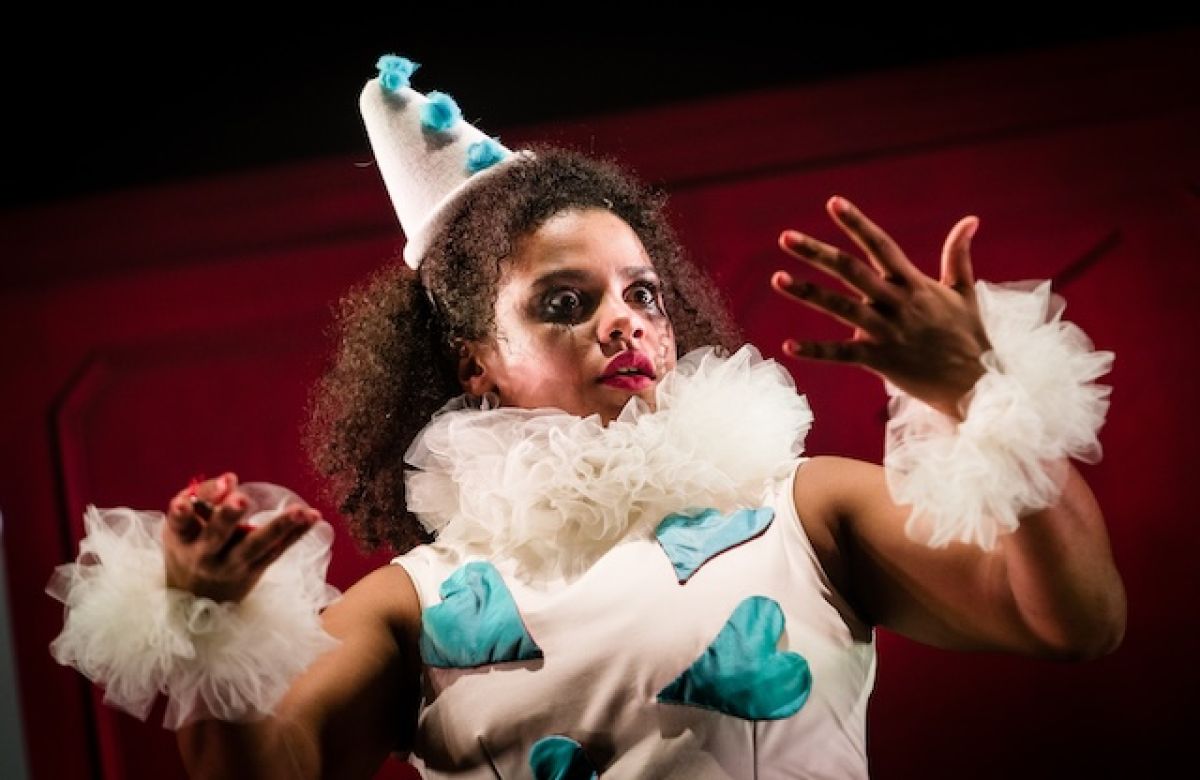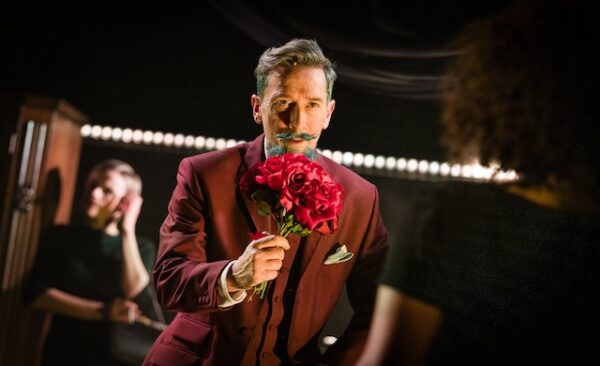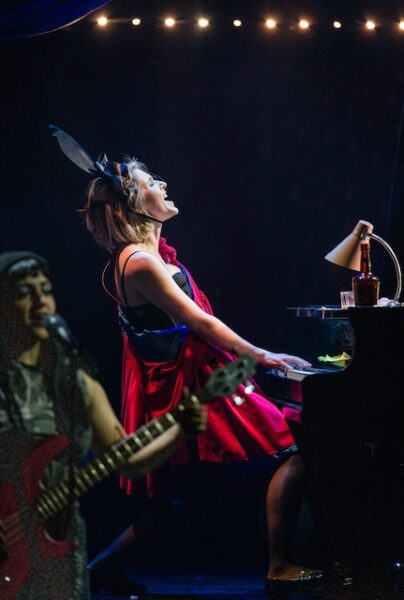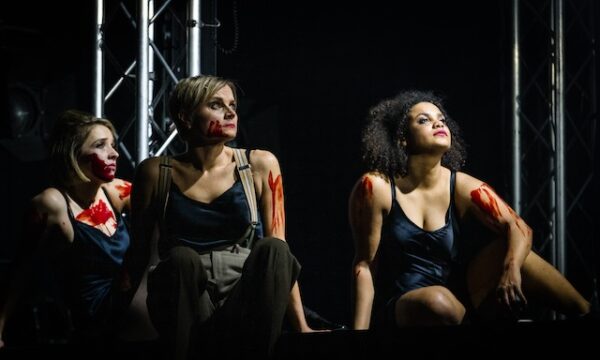Blue Beard review: Problematic and distasteful plastic feminism
By ellathrush

Trigger Warning: sexual assault, rape, and murder
Walking into HOME to see Blue Beard, one is greeted with birdsong and a silkscreen of city lights. It is not the expected setting for one of the most retold fairytales, put to paper by Charles Perrault in 1697, adapted countless times for the screen, opera, ballet, and most famously in Angela Carter’s The Bloody Chamber. Clearly, due to the cultural space this story takes up, one must have something new, something bold to say when adapting it.
I do think it is important to first of all say, the talent this cast holds is marvellous. The music by Stu Barker is sublime, and visually it is very trance-like. It is a shame that the creative efforts and skill of these people have been undervalued by the content of the piece.
The traditional plot of Blue Beard (which is useful to know before seeing the show) follows a young woman who marries the local, deviant lord despite the curious amount of dead wives in his past, to save her family from ruin. Once married and having lost her virginity, she is left alone in the castle with all the keys, yet Blue Beard specifies she cannot open a specific chamber.
Disobeying as soon as he leaves, she finds the bloodied carcasses of each dead wife, still in her wedding dress, still bleeding. She hurries away but the blood on the key signifies she has opened the chamber, condemning her to her own death as soon as Blue Beard returns.
As Blue Beard’s sword is drawn against her, her brother arrives to save the day. Huzzah! The villain is slain and the benevolent patriarchy has saved the day once more. It is a deeply grim tale that has captured the minds of many feminist artists, struggling with why this story of slaughtered women, women unsafe in the domestic setting, women unsafe through their sexuality, simply women just being unsafe still feels so poignant to each generation who read it.

Rice partly does away with the heavy gothic readings that have been placed on the story by having the majority of the play narrated by the Mother Superior of the Sisters of Three Fs, “fearful, fucked, and furious,” (played wonderfully by Katy Owen) to the Lost Brother (Adam Mirsky).
The main narrative of the piece takes in a carnivalesque, cabaretesque, 1960s jazz-club-esque setting. It is here we are introduced to Lucky (Robyn Sinclair), Trouble (Stephanie Hockley), and their mother, Treasure (Patrycja Kujawska), in their grief for their father and husband.
They meet Blue Beard (Tristan Sturrock) in their pursuits for joy at a magic show. Lucky is engaged to be married to Blue Beard after a hallucinogenic courtship of one day. So much creative energy is put into creating this fantasy world in which the plot seems to find safety.
There is something about the joyous, crude theatricality that didn’t sit right with me when looking at the subject matter of the play; the domestic violence and murder are so casualised in the first half, that it genuinely heralded laughs from the audience. There is something childlike, not only in the aesthetic of the piece but in the delivery of dialogue and the engagement with the content that almost rejected emotional connection and audience engagement and develops into something I think becomes problematic. For example, Sinclair, for quite a significant amount of the play, is dressed in a clown costume. Now, I would never put a character who suffers domestic violence in a clown costume, as if to say “How silly of her to bring this on herself, silly fool!” The fact I have to write this about a piece which self-proclaims to be about female empowerment is shocking.

By the end of the first half, the play had meandered and rollicked around to the marriage of Lucky and Blue Beard and almost opening the dreaded bloody chamber, but I was left cold by the songs about greedy women and the tongue-in-cheek comments about how women just want to “love, dance, and cry.” I had no real sense of any drive of where the play would be heading other than Lucky’s save from death by her mother and sister and no real insight as to why it had taken so awfully long to get where we were. While all the musicians were genuinely stunningly talented, at times the songs felt superfluous and took the audience out of the action. The whole style languished in this excessiveness which didn’t serve much.
The whole plot is also intercut with the Lost Brother telling the story of his older sister (Mirabelle Gremaud). These characters are written exactly as you would imagine young people to be written in a play that seems heavily concerned with its middle-aged, middle-class audience– in layman’s terms, they were flat and difficult to connect with. The line “Fuck off everyone!” was delivered like cold, overpriced, disappointing pizza which sums up the vivacity these characters had. It was clear the two stories were going to be twined together at some point, making the audience feel oh-so-smart for working it out, but until that happened the Lost Sister strolled around the stage, disrupting the few moments of potential great theatrical tension.
During the interval, I heard a fellow audience member exclaim, “I think I am sort of enjoying it but I’m not sure.” In essence, this encapsulated the entire piece: unsure of its form and basis of its message, it was hard to see what it expected from us the audience to sink our teeth into.
Returning to the second half, we are introduced to blatant victim-blaming ideology, with the idea of making lusty, desire-driven bargains. We see the anticlimactic fallout of Lucky’s disobedience with a slow-motion wrestle with Blue Beard by the women of the play, who have to become masculine to carry this out. Not only is that misogynistic in its reduction of femininity to an idea of weakness and passivity, but it also is quite underwhelming to watch.
Another point to be made on this is that a woman is not making a bargain with desire when she walks home at night; she is merely existing. A woman is not making a bargain when she marries someone abusive; she is a victim. The play should not in any way have been concerned with victims but rather holding perpetrators to account, questioning the systems that present women as killable and allowing that killing to happen.

After Blue Beard’s death, Treasure gives a small speech about how she wishes for her daughters to be happy, free and alive. Immediately after this, we see through CCTV, the Lost Sister walking home, being followed by a predatory man. Mother Superior removes her vestments to reveal she is the mother of the lost brother and sister and delivers the same speech about living daughters, yet hers is dead. The Lost Brother asks to walk his mother home and then all the cast hold hands and talk about walking home together. How sweet and deep!
There is grief and it is emotive but there was no meaningful link between the two plot lines; there was simply apposition. Yes, I did cry at the end. Not because the art had touched me, but because the kidnapping, raping, and killing of innocent people is deeply and horrifically tragic.
If the play relies on breaking its style to show that this is about to happen in an incredibly voyeuristic way, it speaks to the inability of the style that Rice chooses and the lack of care taken with the subject matter that the two hours before could not communicate this tragedy effectively. It is a cheap and distasteful trick to pull out at the end. It genuinely angered me as it shows that the play was entirely aware of who it was doing a disservice to and how it cheapened and trivialised serious sexual assault. The whole thing felt incredibly hollow and for a play so apparently concerned with storytelling, it did very little to mine the meaning out of what could have been a wonderful theatrical experience.
If you are going to do a ludic play of Blue Beard, one must weigh the violence of the piece equally to that of the comic, fanciful elements. My trusted friend on the bus home said that they could not believe that a woman had written and directed what we had just seen. To end on a note that was basically, “Oh yes, the world is terrible but at least there are some nice men who will walk us home to protect us from the scary men,” is genuinely shocking when looking at the other artistic responses Blue Beard has received.
On the whole, this is not a question of style over substance; it is an issue where style becomes in itself problematic and distasteful, trying to be deep yet achieving little more than a form of plastic feminism.
Blue Beard runs until 24 February at HOME. You can find tickets here.







